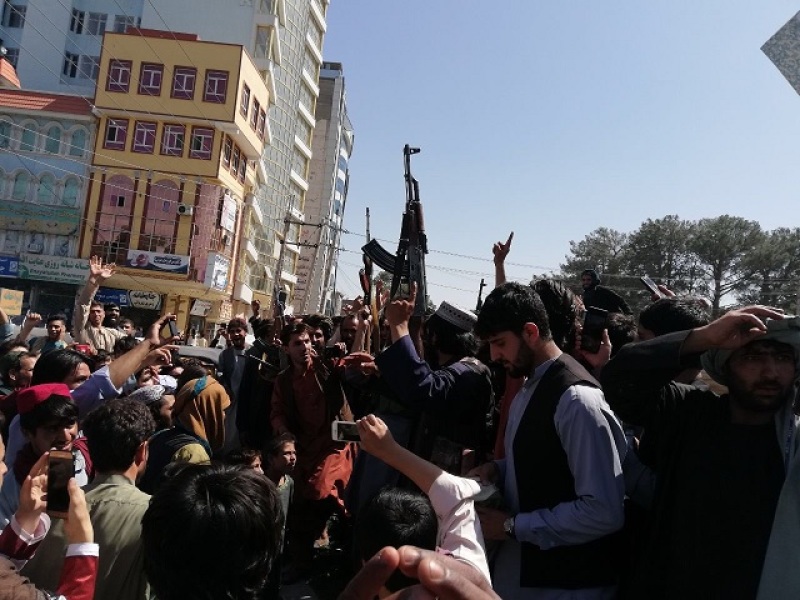
The area between Afghanistan and Pakistan is seeing a surge in refugees as many continue to flee the Taliban-controlled country after the failed U.S. withdrawal that concluded on August 31.
Thousands of Afghans and and persecuted Hazara, a Shia ethnic group, are hoping to cross the Pakistan border in Afghanistan and into the Pakistani city of Chaman, which has now become a "military zone," as reported by the Taliban police officials who are patrolling the overcrowded area.
"Pakistan is creating problems. We have an understanding with Pakistan to allow Kandahar people to cross into Pakistan. In return, people from Chaman and Quetta can enter Afghanistan using National IDs," 28 year old Mohammad Sadiq Sabery, who patrols the border area in Kandahar, explained via the New York Post. "They have not stood on their word. We don't have any other solution for people, as both sides are interconnected. Kids, women, and patients are waiting in line and losing their lives from the heat."
Instead of welcoming those who seek safety and a better life in neighboring Pakistan, Sabery said that the Pakistanis "have a full army on their side of the border. Pakistan is ready to fight, but the Taliban isn't."
According to the United Nations, about 10,000 refugees have entered Pakistan since mid-August, following the Taliban's takeover of the Presidential Palace of Afghanistan. However, Islamabad has restricted entry in recent weeks, only allowing entry to the key international intersection to Pakistani or Kandahar identification cardholders. But those who are stranded on the border say that Pakistan has completely closed off the passage to everyone, regardless of ID or passport status.
The Taliban has called upon Pakistan to reopen the border "at the very least on urgent humanitarian grounds." Trucks carrying perishable goods have been backed up for miles, causing their cargo to rot under the hot desert sun. Earlier this month, the exodus to the Pakistan border caused the death of at least one person. The Taliban claims more people have perished and died due to dehydration and heat stroke.
According to Al Jazeera, the UN High Commissioner for Refugees has warned of a possible humanitarian crisis at the Afghan border. The agency's latest Afghanistan sitaution report read, "The majority of Afghan new arrivals approaching UNHCR in Pakistan and Iran are largely undocumented and a large majority of Afghan new arrivals interviewed by UNHCR report leaving Afghanistan for security-related reasons."
The report said that there are more than 3.5 million Afghans who have fled their homes for other regions in the country, while more than 19,300 new Afghan refugees retreated to Iran, 10,800 to Pakistan, and 5,300 to Tajikistan. Among them are Hazara people, who are being targeted by the Taliban, The Independent reported.
Wahed, a 29 year old Afghan police officer and father of four paid more than $680 to escape Afghanistan with his family and sneak past the Taliban and Pakistan authorities in the middle of the night. He also paid an extra $70 to separately smuggle his police IDs over the Pakistani border, which if found would get him killed. But he needed those papers to secure asylum in Pakistan.
Wahed is a two-time refugee and a Hazara whose wife is also wanted by the Taliban for her women's rights work. Just days before they escaped Afghanistan, rifle-wielding foot soldiers of the Taliban rushed to their home in Kabul.
"The Taliban are lying about the general amnesty. It is a total lie. If that was the case, then why did they come to my home looking for me and my wife?" Wahed asked, now safely housed in an unofficial secret refugee camp for fleeing Hazara families in Pakistan.
The Hazara families in this refugee center lack money and legal papers, except for scraps of paper from a local partner of the United Nations that prove they've logged their asylum claims with the Pakistani authorities.
Qaiser Afridi, a spokesperson for UNHCR in Pakistan lamented, "This is why the UN is advocating neighbouring countries to keep their borders open for those seeking safety. There must be burden and responsibility sharing," a last resort for the failed U.S. withdrawal to deal with the brewing refugee crisis.



























